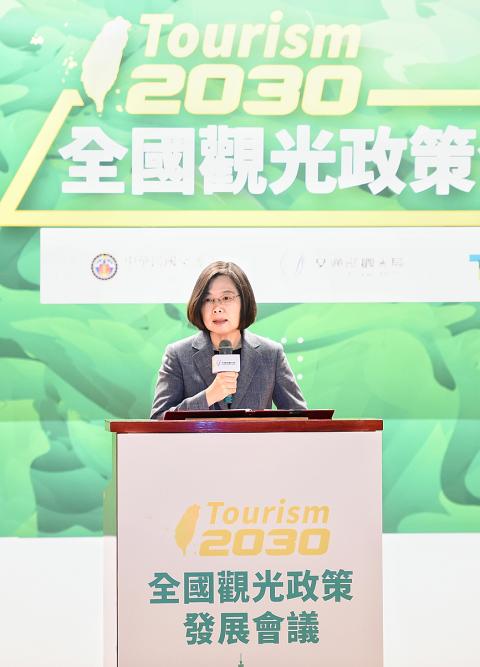Promising to turn Taiwan into one of Asia’s prime travel destinations in the next 10 years, President Tsai Ing-wen (蔡英文) yesterday said that tourism would become a growth driver for the nation’s economy, generating more than NT$1 trillion (US$33 billion) in output.
“We introduced the ‘Big Southern Project’ on Sunday, which is to be enforced to balance development in northern and southern Taiwan. Our goal is that the tourism industry becomes a locomotive that drives the economy forward,” she said at the opening of the “Tourism 2030: National Tourism Policy Development Conference.”
As of last week, Taiwan had received 11.11 million international visitors this year, which would be the fifth year that the number of foreign travelers has exceeded 10 million, Tsai said.

Photo: Chu Pei-hsiung, Taipei Times
The latest Global Muslim Travel Index ranked Taiwan No. 3 among its non-Muslim country travel destinations, she added.
“The most important thing is that all these statistics and rankings are real, not numbers that the government has inflated,” she said.
Tsai added that she was the nation’s first president to organize a campaign to invite Internet celebrities to come and spend one night at the Presidential Office, as a way to introduce Taiwan to the world.
One of them, Palestinian-Israeli Nuseir Yassin, posted videos on his Facebook page titled “Nas Daily,” which is followed by more than 14 million people around the world, Tsai said, adding that the nation would have more exposure in the international community through Internet celebrities like Yassin.
As the government would concentrate on promoting Taiwan’s mountains and other ecological resources to international tourists next year, Tsai said that it would also introduce Aboriginal cultures, which would add value to the nation’s tourism industry.
Asked why the nation has seen a large increase in hotel revenue, although Chinese tourist numbers have dropped by more than 1 million, Tsai said that while the ratio of Chinese visitors has dropped from 44 percent to 24 percent, the nation has still seen an increase in overall tourist numbers.
“We will continue to find new sources of international travelers and hope to elevate the nation’s travel quality and quantity by building on the current foundation,” she said.
Minister of Transportation and Communications Lin Chia-lung (林佳龍) said that a new record was set last week when the number of Japanese travelers exceeded 2 million for the first time.
In October, the number of international travelers who are not from China rose by 16 percent, also a new record.
Statistics from the Tourism Bureau showed that the nation’s foreign-exchange earnings from tourism hit a peak in 2014 at US$14.61 billion.
That was followed by a drop to US$14.38 billion in 2015, US$13.37 billion in 2016 and US$12.31 billion in 2017. However, the figure rebounded last year to US$13.7 billion.
International tourist numbers rose 3.05 percent last year to 11.06 million, with visitors spending 6.46 nights on average.
Their average daily expense rose 6.83 percent to US$191.7 last year, a large part of which was spent on accommodation, which was about 35 percent, it said.

The CIA has a message for Chinese government officials worried about their place in Chinese President Xi Jinping’s (習近平) government: Come work with us. The agency released two Mandarin-language videos on social media on Thursday inviting disgruntled officials to contact the CIA. The recruitment videos posted on YouTube and X racked up more than 5 million views combined in their first day. The outreach comes as CIA Director John Ratcliffe has vowed to boost the agency’s use of intelligence from human sources and its focus on China, which has recently targeted US officials with its own espionage operations. The videos are “aimed at

STEADFAST FRIEND: The bills encourage increased Taiwan-US engagement and address China’s distortion of UN Resolution 2758 to isolate Taiwan internationally The Presidential Office yesterday thanked the US House of Representatives for unanimously passing two Taiwan-related bills highlighting its solid support for Taiwan’s democracy and global participation, and for deepening bilateral relations. One of the bills, the Taiwan Assurance Implementation Act, requires the US Department of State to periodically review its guidelines for engagement with Taiwan, and report to the US Congress on the guidelines and plans to lift self-imposed limitations on US-Taiwan engagement. The other bill is the Taiwan International Solidarity Act, which clarifies that UN Resolution 2758 does not address the issue of the representation of Taiwan or its people in

US Indo-Pacific Commander Admiral Samuel Paparo on Friday expressed concern over the rate at which China is diversifying its military exercises, the Financial Times (FT) reported on Saturday. “The rates of change on the depth and breadth of their exercises is the one non-linear effect that I’ve seen in the last year that wakes me up at night or keeps me up at night,” Paparo was quoted by FT as saying while attending the annual Sedona Forum at the McCain Institute in Arizona. Paparo also expressed concern over the speed with which China was expanding its military. While the US

SHIFT: Taiwan’s better-than-expected first-quarter GDP and signs of weakness in the US have driven global capital back to emerging markets, the central bank head said The central bank yesterday blamed market speculation for the steep rise in the local currency, and urged exporters and financial institutions to stay calm and stop panic sell-offs to avoid hurting their own profitability. The nation’s top monetary policymaker said that it would step in, if necessary, to maintain order and stability in the foreign exchange market. The remarks came as the NT dollar yesterday closed up NT$0.919 to NT$30.145 against the US dollar in Taipei trading, after rising as high as NT$29.59 in intraday trading. The local currency has surged 5.85 percent against the greenback over the past two sessions, central